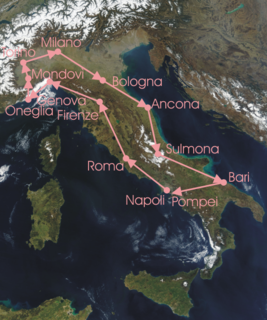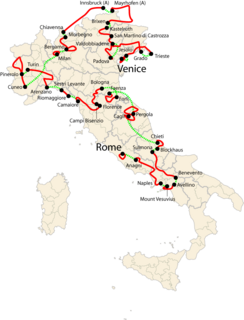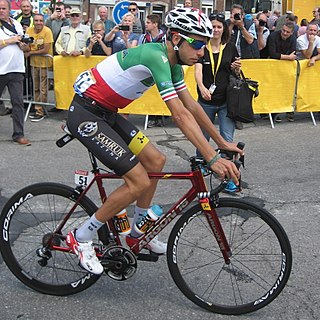Related Research Articles

The Giro d'Italia is an annual multiple-stage bicycle race primarily held in Italy, while also starting in, or passing through, other countries. The first race was organized in 1909 to increase sales of the newspaper La Gazzetta dello Sport; and is still run by a subsidiary of that paper's owner. The race has been held annually since its first edition in 1909, except during the two world wars and the 2020 coronavirus pandemic. As the Giro gained prominence and popularity the race was lengthened, and the peloton expanded from primarily Italian participation to riders from all over the world. The Giro is a UCI World Tour event, which means that the teams that compete in the race are mostly UCI WorldTeams, with some additional teams invited as 'wild cards'.

The Giro d'Italia Femminile is an annual elite women's road bicycle racing stage race. One of the main races in women's road cycling, it was rebranded in 2013 as the Giro Rosa, having previously been branded the Giro Donne.

Luigi Ganna was an Italian professional road racing cyclist. He was the overall winner of the first Giro d'Italia, held in 1909, as well as the first Italian winner of the classic Milan–San Remo earlier that year. Further highlights in his career were his fifth place in the 1908 Tour de France and several podium places in Italian classic races. In 1908 he set a new Italian hour record, which he held for six years.

Claudia Lichtenberg is a German former professional cyclist. In 2009, she won the Tour de l'Aude, a race which has been called the "women's Tour de France", and also the Giro d'Italia Femminile.
The 1962 Giro d'Italia was the 45th running of the Giro d'Italia, one of cycling's Grand Tour races. The Giro started in Milan, on 19 May, with a 185 km (115.0 mi) stage and concluded back in Milan, on 9 June, with a 160 km (99.4 mi) leg. A total of 170 riders from 17 teams entered the 21-stage race, which was won by Italian Franco Balmamion of the Carpano team. The second and third places were taken by Italian riders Imerio Massignan and Nino Defilippis, respectively.

The 1909 Giro d'Italia was the inaugural running of the Giro d'Italia, a cycling race organized and sponsored by the newspaper La Gazzetta dello Sport. The event began in Milan on 13 May with a 397 km (247 mi) first stage to Bologna, finishing back in Milan on 30 May after a final stage of 206 km (128 mi) and a total distance covered of 2,447.9 km (1,521 mi). The race was won by the Italian rider Luigi Ganna of the Atala team, with fellow Italians Carlo Galetti and Giovanni Rossignoli coming in second and third respectively.
The 1978 Giro d'Italia was the 61st running of the Giro d'Italia, one of cycling's Grand Tours races. The Giro started in Saint-Vincent, on 7 May, with a 2 km (1.2 mi) prologue and concluded in Milan, on 28 May, with a 220 km (136.7 mi) mass-start stage. A total of 130 riders from thirteen teams entered the 20-stage race, that was won by Belgian Johan de Muynck of the Bianchi team. The second and third places were taken by Italians Gianbattista Baronchelli and Francesco Moser, respectively. As of the beginning of the 2020 cycling season this was the last time a Belgian rider won a Grand Tour.

The 1910 Giro d'Italia was the second edition of the Giro d'Italia, a cycling race organized and sponsored by the newspaper La Gazzetta dello Sport. The race began on 18 May in Milan with a stage that stretched 388 km (241 mi) to Udine, finishing back in Milan on 5 June after a 277.5 km (172 mi) stage and a total distance covered of 2,987.4 km (1,856 mi). The race was won by the Italian rider Carlo Galetti of the Atala-Continental team, with fellow Italians Eberardo Pavesi and Luigi Ganna coming in second and third respectively.

The 1911 Giro d'Italia was the 3rd edition of the Giro d'Italia, a cycling race set up and sponsored by the newspaper La Gazzetta dello Sport. The race began on 18 May in Rome with a stage that stretched 394.1 km (245 mi) to Florence. It was composed of twelve stages that covered a total distance of 3,530.3 km (2,194 mi). The race came to a close back in Rome on 6 June after a 266.9 km (166 mi) stage. The race was won by the Italian rider Carlo Galetti of the Bianchi team. Second and third respectively were the Italian riders Giovanni Rossignoli and Giovanni Gerbi.

The 2009 Giro d'Italia was the 92nd running of the Giro d'Italia, one of cycling's Grand Tours. It was held from 9 to 31 May 2009, and marked the 100th year since the first edition of the race. Starting in Venice and finishing in Rome, 22 teams competed over 21 stages.

The 1924 Giro d'Italia was the 12th edition of the Giro d'Italia, a cycling race organized and sponsored by the newspaper La Gazzetta dello Sport. The race began on 10 May in Milan with a stage that stretched 300.3 km (187 mi) to Genoa, finishing back in Milan on 1 June after a 313 km (194 mi) stage and a total distance covered of 3,613 km (2,245 mi). The race was won by the Italian rider Giuseppe Enrici. Second and third respectively were the Italian riders Federico Gay and Angiolo Gabrielli.

The 1912 Giro d'Italia was the 4th edition of the Giro d'Italia, a cycling race set up and sponsored by the newspaper La Gazzetta dello Sport. The race began on 19 May in Milan with a stage that stretched 398.8 km (248 mi) to Padua. The race was composed of nine stages that covered a total distance of 2,733.6 km (1,699 mi). The race came to a close in Bergamo on 4 June after a 235 km (146 mi) stage. The race was won by the Atala-Dunlop team that finished with Carlo Galetti, Eberardo Pavesi, and Giovanni Micheletto. Second and third respectively were Peugeot and Gerbi.

The 1913 Giro d'Italia was the 5th edition of the Giro d'Italia, a cycling race organized and sponsored by the newspaper La Gazzetta dello Sport. The race began on 6 May in Milan with a stage that stretched 341 km (212 mi) to Genoa, finishing back in Milan on 22 May after a 321.1 km (200 mi) stage and a total distance covered of 2,932 km (1,822 mi). The race was won by the Italian rider Carlo Oriani of the Maino team. Second and third respectively were the Italian riders Eberardo Pavesi and Giuseppe Azzini.

The 1914 Giro d'Italia was the 6th Giro d'Italia cycling race; it was organised and sponsored by the newspaper La Gazzetta dello Sport. The race began on 24 May in Milan with a stage that stretched 420 km (261 mi) to Cuneo, finishing back in Milan on 6 June after a 420.3 km (261 mi) stage and a total distance covered of 3,162 km (1,965 mi). The race was won by the Italian rider Alfonso Calzolari of the Stucchi team. Second and third respectively were the Italian riders Pierino Albini and Luigi Lucotti.

Fabio Aru is an Italian professional road bicycle racer, who currently rides for UCI WorldTeam UAE Team Emirates.
Dario Beni was an Italian professional road racing cyclist who was born in Rome, Italy. He won the first ever stage in Giro d'Italia history in 1909. In total he won three stages at the Giro d'Italia.

Richard Antonio Carapaz Montenegro is an Ecuadorian cyclist, who currently rides for UCI WorldTeam Team Ineos. In June 2019, Carapaz won the 2019 Giro d'Italia, becoming the first Ecuadorian rider to win the race. He is nicknamed "La Locomotora".
References
- ↑ "Ottorino Celli". museociclismo. Retrieved 1 June 2015.
- ↑ "1909 Giro d'Italia". Bike Race Info. Retrieved 1 June 2015.
- ↑ "Giro d'Italia 1909". Cycling Archives. Retrieved 1 June 2015.